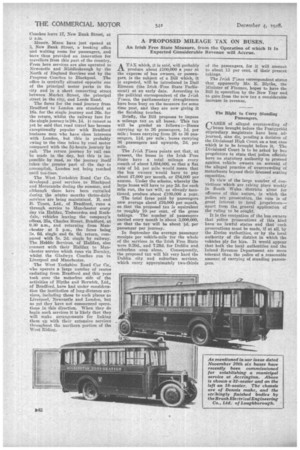A PROPOSED MILEAGE TAX ON BUSES.
Page 26

If you've noticed an error in this article please click here to report it so we can fix it.
An Irish Free State Measure, from the Operation of which It Is Expected Considerable Revenue will Accrue.
A TAX which, it is said, will probably produce about 1100,000 a year at the expense of bus owners, or passengers, is the subject of a Bill which, it is expected, will be introduced in Dail Eireann (the Irish Free State Parliament) at an early date. According to the political correspondent of the Irish Times, the parliamentary draughtsmen have been busy on the measure for some time past, and they are now giving it the finishing touches, Briefly, the Bill proposes to impose a mileage tax on all buses. This tax will be graded aS follows :—Buses carryine' up to 26 passengers, 1d. per mile ; buses carrying from 26 to 86 pass sengers, lid. per mile ; buses carrying 36 passengers and upwards, 2d. per mile.
The Irish Times points out that, at present, the buses in the Irish Free State have a total mileage every month of about 1,694,000, so that a fiat rate of id. per mile would mean that the bus owners would have to pay about 17,000 per month, or 184,000 per annum. Under the scheme, whereby the large buses will have to pay 2d. for each mile run, the tax will, as already mentioned, produce about 1100,000 a year.
The total fares paid by passengers now average about 170,000 per month, so that the proposed tax is equivalent to roughly 10 per cent, of the gross takings. The number of passengers carried every month is about 3,000,000, so that the tax will be about id. per passenger per journey.
In September the average passenger receipts per vehicle-mile for the whole of the services in the Irish Free State were 9.20d., and 7.28d, for Dublin and suburban area alone. Consequently, the proposed tax will hit very hard the Dublin city and suburban services, which carry approximately two-thirds of the passengers, for it will amount to about 13 per cent, of their present takings..
The Irish Times correspondent states that apparently Mr. E. Blythe, the Minister of Finance, hopes to have the Bill in operation by the New Year and to gain from the new tax a considerable increase in revenue.
The Right to Carry Standing Passengers.
CASESCASES of alleged overcrowding of of before the Pontypridd stipendiary magistrate have been, adjourned, sine die, pending a decision of the Divisional High Court on a test case which is to be brought before it. The Divisional Court is to be asked by bus proprietors to state that police officials have 110 statutory authority to proceed against vehicle owners on account of the alleged practice of overcrowding of motorbuses beyond their licensed seating capacities.
In view of the large number of convictions which are taking place weekly in South Wales districts alone for offences of this nature, in which the police are prosecutors, the case is of great interest to local proprietors— apart from the general application of the ruling to be sought.
It is the contention of the bus owners that police prosecutions of this kind have no lawful status and that ouch prosecutions must be made, if at all, by the Excise authorities, or by the local authority of the district in which the vehicles ply for hire. It would appear that both the local authorities and the Inland Revenue Department are mere tolerant than the police of a reasonable amount of carrying of standing passengers.






























